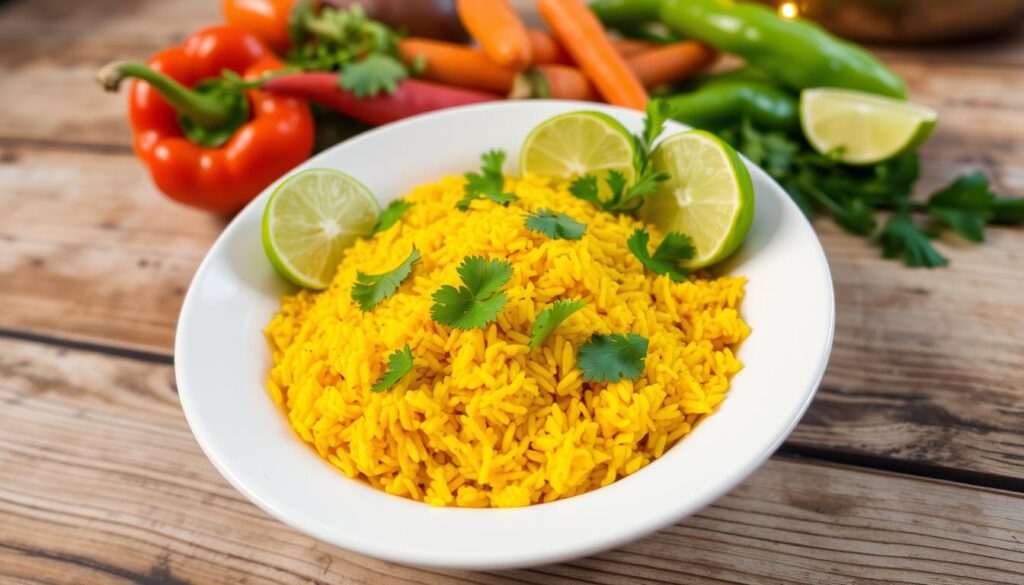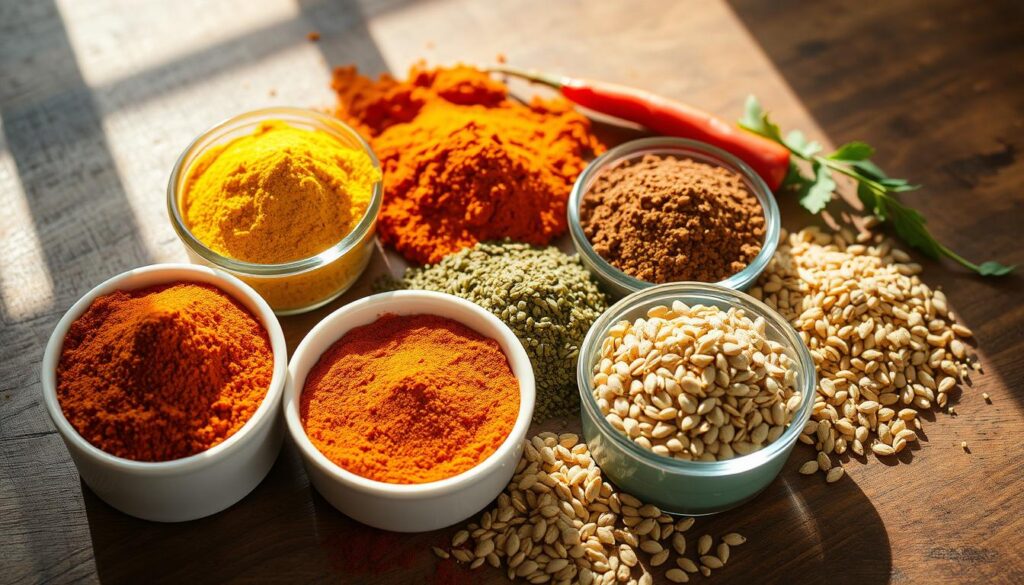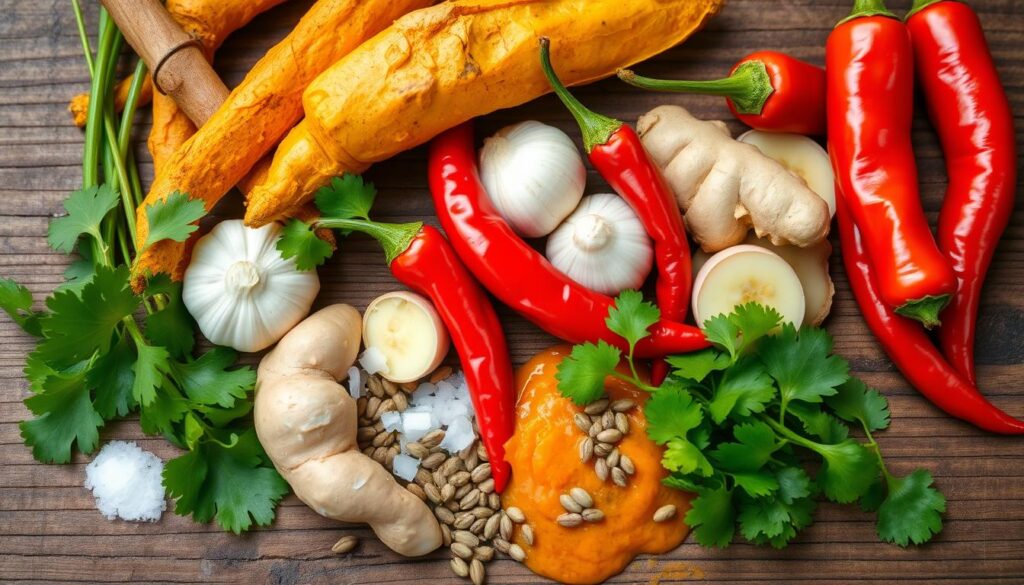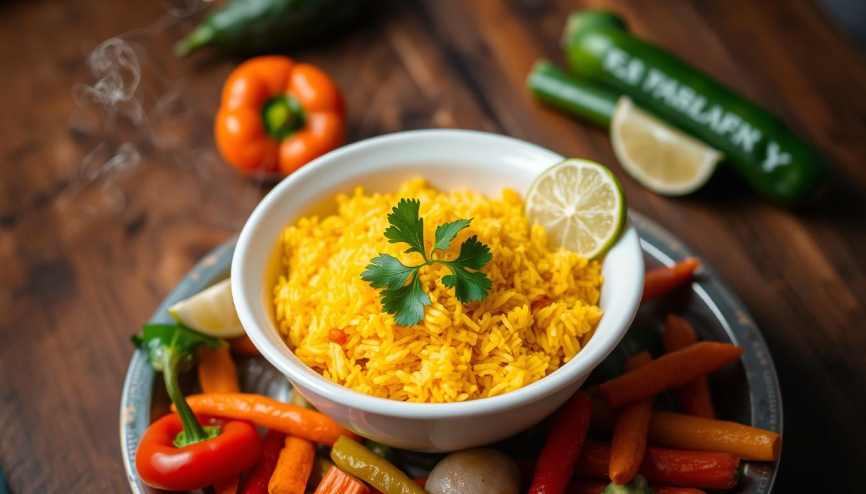Explore the East’s flavors with this golden curry recipe, easy to make at home. It’s inspired by Japanese curry, offering warmth and delight. Enjoy a smooth texture and bold spices that make dinner special.

Key Takeaways
- Discover the origins and unique flavor profile of authentic golden curry
- Master the art of creating the perfect curry powder blend
- Learn how to incorporate coconut milk for a luxurious curry sauce
- Explore vegetarian and chicken-based curry variations
- Uncover the secrets to perfecting your curry cooking techniques
- Pair your curry with delicious accompaniments like rice and naan
- Savor the comforting and satisfying flavors of homemade golden curry
What is Golden Curry?
Golden curry, also known as Japanese curry, is a dish loved by many. It comes from Japan and has a golden sauce with a mix of spices. It’s smooth and has a unique taste that makes it special.
Origin and Popularity
Golden curry started in Japan in the late 19th century. It was influenced by British and Indian cooking. Japanese chefs made it their own, creating a favorite dish in Japan and worldwide.
Unique Flavor Profile
- The golden sauce comes from turmeric, giving it its color.
- It tastes savory, sweet, and a bit spicy, making it comforting and versatile.
- The sauce’s smoothness comes from careful preparation and simmering.
Golden curry is different from other curries because of its special flavors. It’s perfect for a hearty meal. People love it in Japanese restaurants and making it at home.
“Golden curry is a true taste of Japan, with its distinct flavor profile and comforting, creamy texture. It’s a dish that has won the hearts of curry lovers around the globe.”
Ingredients for Authentic Golden Curry
Making an authentic golden curry is all about the right curry ingredients. At its core is the curry spice blend. This mix of spices gives the curry its unique taste. Turmeric adds warmth, while cumin brings depth.
The curry paste is also key. It’s made with lemongrass, ginger, and chilies. This paste adds a rich flavor that curry powder can’t match. The blend of spice and paste makes golden curry special.
Essential Curry Ingredients:
- Turmeric: Provides the golden color and a hint of earthiness.
- Cumin: Adds a warm, smoky flavor.
- Coriander: Brings a citrusy aroma and taste.
- Chili Powder: Adds a touch of heat and flavor.
- Ginger: Gives a refreshing, peppery kick.
- Lemongrass: Adds a bright, lemony flavor to the paste.
- Galangal: Offers a peppery, pine-like taste.
- Kaffir Lime Leaves: Add a fragrant, floral note to the paste.
By mixing these curry ingredients carefully, you can make a true golden curry. It will excite your taste buds and take you to Southeast Asia.
Golden Curry Recipe
Step-by-Step Instructions
Making a tasty golden curry is simpler than you think. Just follow these easy steps to make a real, flavorful curry at home. This homemade curry recipe will help you get the spices and textures just right, whether you’re a curry lover or just starting out.
- First, get all your ingredients ready. You’ll need aromatic spices, good curry powder, and rich coconut milk.
- Then, toast spices like cumin, coriander, and fennel seeds in a dry pan until they smell great. This step makes your golden curry even more flavorful.
- Grind the toasted spices into a fine powder. You can use a spice grinder or mortar and pestle. This fresh spice mix is the base of your curry cooking instructions.
- In a big pot or Dutch oven, cook onions, garlic, and ginger until they’re soft and smell nice.
- Next, add the ground spice blend, curry powder, and a bit of tomato paste. Stir it all up to coat the aromatics.
- Now, pour in coconut milk and chicken or vegetable broth. Let the golden curry recipe simmer so the flavors can mix well.
- Season it to taste, adding salt, pepper, or a bit of sweetness if you like.
- Finally, add your protein, like chicken or tofu, and let it simmer until it’s fully cooked and the flavors are rich.
Enjoy your homemade golden curry over steamed rice or with warm naan bread. The secret to a great curry cooking instructions is getting the spices right and letting the flavors blend. This makes for a delicious and comforting meal.
Vegetarian Golden Curry Variations
Vegetarian and plant-based curry lovers can enjoy the tasty flavors of golden curry without meat. You can find many nutritious protein options to make vegetarian curry and meatless curry dishes. These dishes are perfect for different diets.
Plant-Based Protein Options
For a plant-based curry, you can add various protein-rich ingredients. This makes your meal fulfilling and balanced. Here are some great choices:
- Tofu: Firm or extra-firm tofu can be cubed and simmered in the curry sauce. It becomes tender and absorbs flavors well.
- Tempeh: This fermented soy-based product has a unique nutty flavor and firm texture. It pairs well with golden curry.
- Chickpeas: Canned or cooked chickpeas add heartiness and a creamy, satisfying element to the vegetarian curry.
- Lentils: Red, brown, or green lentils can be simmered directly in the curry. They add protein and a satisfying bite.
- Mushrooms: Sautéed mushrooms, such as button, portobello, or shiitake, add an umami-rich depth to the meatless curry.
By trying out these versatile plant-based protein sources, you can make a delicious and nourishing vegetarian curry. It will please even the most picky eaters.
Chicken Golden Curry Recipe
Discover the secret to creating an authentic chicken curry recipe with golden curry’s rich flavors. This dish combines tender chicken with a velvety, spice-infused sauce. It’s a comforting, Japanese-inspired meal that will satisfy your cravings.
The key to this golden curry with chicken is in the ingredients. Marinate the chicken in spices and aromatics for deep flavor. High-quality curry powder and fresh coconut milk add creaminess and complexity.
Ingredients for Authentic Chicken Golden Curry
- 1 lb boneless, skinless chicken thighs, cut into 1-inch pieces
- 2 tablespoons ginger-garlic paste
- 1 teaspoon ground cumin
- 1 teaspoon ground coriander
- 1/2 teaspoon chili powder
- 1/4 teaspoon turmeric
- Salt and pepper to taste
- 2 tablespoons vegetable oil
- 1 onion, finely chopped
- 3 cloves garlic, minced
- 2 tablespoons curry powder
- 1 cup coconut milk
- 1 cup chicken broth
- 2 tablespoons tomato paste
- 1 teaspoon sugar
Follow this list of authentic chicken curry ingredients for a flavorful dish. It’s perfectly balanced and bursting with taste.
Preparing the Chicken
- In a bowl, combine the chicken, ginger-garlic paste, cumin, coriander, chili powder, turmeric, salt, and pepper. Mix well and let marinate for 30 minutes.
- Heat the vegetable oil in a large skillet over medium-high heat. Add the marinated chicken and sauté until browned on all sides, about 5-7 minutes. Remove the chicken from the skillet and set aside.
Making the Curry Sauce
- In the same skillet, add the chopped onion and sauté until translucent, about 3-5 minutes.
- Add the minced garlic and curry powder, and cook for 1 minute, stirring constantly, to toast the spices.
- Pour in the coconut milk, chicken broth, tomato paste, and sugar. Stir well and bring the mixture to a simmer.
- Add the sautéed chicken back to the skillet and let the curry simmer for 15-20 minutes, or until the chicken is cooked through and the sauce has thickened.
Serve this chicken curry recipe hot with steamed rice or naan bread. Garnish with freshly chopped cilantro for a delicious golden curry with chicken experience.
Curry Powder Blend Secrets
The secret to a great curry is in the spice blend. Making the perfect curry powder blend is key. It brings out the authentic, aromatic flavors that excite your taste buds. The best way is to toast and grind your own spices for the best taste.
Toasting and Grinding Spices
Start with high-quality, whole spices like cumin, coriander, cardamom, cloves, and chili peppers. Toasting these spices in a dry pan over medium heat brings out their strong aromas. This adds depth and complexity to your curry powder blend.
Once they smell great, let them cool down. Then, grind them into a fine powder. You can use a spice grinder or mortar and pestle for this.
| Spice | Quantity | Benefits |
|---|---|---|
| Cumin | 2 tablespoons | Earthy, nutty flavor |
| Coriander | 2 tablespoons | Citrusy, floral aroma |
| Cardamom | 1 teaspoon | Warm, slightly menthol-like taste |
| Cloves | 1 teaspoon | Sweet, aromatic flavor |
| Chili Peppers | 1-2 teaspoons | Heat and depth of flavor |
Mixing these toasted, ground spices makes a vibrant and complex curry powder blend. It will make your homemade golden curry taste amazing. Try different mixes to find your favorite spice balance.

“The secret to a great curry lies in the perfect blend of spices. Toasting and grinding your own spices is the key to unlocking their full potential.”
Coconut Milk in Curry Sauce
Coconut milk is key to making golden curry sauce creamy and rich. It adds a creamy layer that goes well with spices. This makes the curry sauce even more enjoyable to eat.
Coconut milk makes the curry feel luxurious and smooth. Its fats and oils help make the sauce silky and creamy. This makes the curry a true comfort food.
| Ingredient | Quantity | Purpose |
|---|---|---|
| Coconut milk | 1 can (13.5 oz) | Adds rich, creamy texture and flavor to the coconut milk curry |
| Curry powder | 2 tablespoons | Provides the signature spice blend for the creamy curry sauce |
| Onion | 1 medium, diced | Contributes to the aromatic base of the coconut milk in curry |
| Garlic | 3 cloves, minced | Enhances the depth of flavor in the coconut milk curry |
Coconut milk and spices together make a creamy curry sauce that’s both comforting and flavorful. This ingredient is great in many curry dishes. It’s essential for a perfect curry experience.
Authentic Curry Paste Ingredients
Making a real Japanese-style curry paste is key to getting its bold, aromatic flavors. It’s all about mixing fragrant spices and fresh aromatics. This mix creates a complex yet satisfying taste.
Aromatic Curry Paste Base
The base of a real curry paste starts with special spices. Curry paste ingredients include spices like cumin, coriander, and turmeric. These spices add depth and a golden color. They’re toasted and ground to bring out their full flavor.
Along with spices, fresh aromatics like garlic, ginger, and shallots are added. These add a fragrant and pungent taste to the authentic curry paste. They’re finely minced or pounded to blend well with the other ingredients.
| Key Curry Paste Ingredients | Flavor Contribution |
|---|---|
| Cumin | Earthy, warm, and slightly smoky |
| Coriander | Bright, citrusy, and slightly sweet |
| Turmeric | Vibrant golden color and subtle bitterness |
| Garlic | Pungent, savory, and aromatic |
| Ginger | Spicy, slightly sweet, and refreshing |
| Shallots | Delicate, sweet, and slightly acidic |
By mixing these curry paste ingredients carefully, you can make a homemade curry paste. It captures the essence of Japanese-inspired cuisine. Your dishes will become comforting and flavorful.

Curry Cooking Techniques
Making a delicious golden curry is more than just using the right ingredients. The cooking techniques are key to unlocking flavor and texture. Learn these essential curry cooking techniques, curry preparation methods, and curry cooking tips for your curry journey.
Simmering the Curry Sauce
Simmering the sauce is a crucial step in making curry. Let the curry sauce simmer gently for 30 minutes to an hour. This helps the flavors blend and the sauce thicken. It’s a patient process that makes the curry truly special.
Layering Spices and Aromatics
The art of curry cooking techniques is in layering spices and aromatics. Start by toasting and grinding whole spices to release their oils. Then, add them at different times to build flavor. Use ginger, garlic, and onions in a specific order to add their unique flavors to the dish.
| Curry Cooking Technique | Description |
|---|---|
| Tempering | Gently frying whole spices in oil or ghee to release their aroma and flavors before adding them to the curry. |
| Blooming | Sautéing ground spices in a small amount of oil or ghee to amplify their flavor and aroma. |
| Slow Simmering | Allowing the curry to simmer gently for an extended period to develop complexity and depth of flavor. |
Mastering these curry cooking techniques and curry preparation methods will help you make a curry that’s both authentic and delicious.
Serving Suggestions and Garnishes
Make your homemade golden curry even better with the right sides. The dish’s rich flavors pair well with fluffy white rice and soft naan bread.
Pairing with Rice and Naan
Steamed white rice is a great match for golden curry. Its light texture lets the curry’s bold flavors shine. Warm naan bread is also a perfect choice, letting you enjoy every bit of the curry.
- Serve golden curry over a bed of steamed white rice
- Offer warm naan bread for dipping and soaking up the flavorful sauce
- Experiment with different types of rice, such as basmati or jasmine, to find your preferred combination
Enhance your curry with various garnishes. Choose from herbs, vegetables, fried onions, or nuts. The options are endless.
Garnishes like chopped cilantro, sliced green onions, and toasted coconut flakes can add a pop of color and texture to your golden curry dish.
Conclusion
In our journey through golden curry, we’ve discovered its rich history and delicious flavors. We’ve learned how to make a true golden curry at home. This dish is loved by many for good reason.
Making your own homemade curry brings many benefits. You can choose the ingredients and enjoy the process of creating a tasty meal. The curry cooking experience opens up new culinary adventures. You can try different versions, use plant-based ingredients, and improve your skills.
As we end this journey, we invite you to keep exploring golden curry. Enjoy the smells, taste the flavors, and feel proud of making a special meal at home. Your kitchen is the place to create unforgettable dishes.

